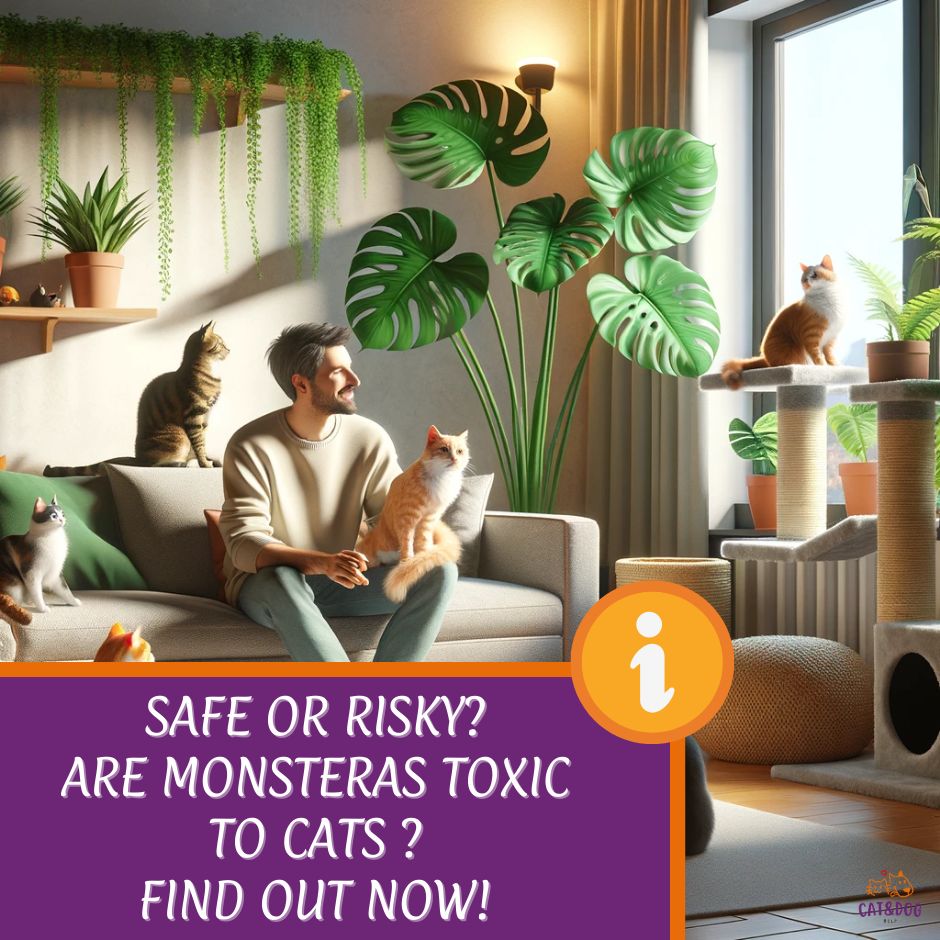Monstera deliciosa, with its distinctive and charming split leaves, has become a staple in the modern home for those who love to add a touch of nature to their living spaces.
However, if you’re a cat parent, you may have stopped mid-scroll through your favorite plant blog, pondering, “Are Monstera toxic to cats? Could this lush greenery be harmful to my furry friend?”
The answer, unfortunately, is yes; Monstera plants do pose a toxicity risk to cats, so caution is advised for pet owners.
This revelation might come as a downside to the aesthetic pleasures these plants provide, balancing beauty with pet safety in your home environment.
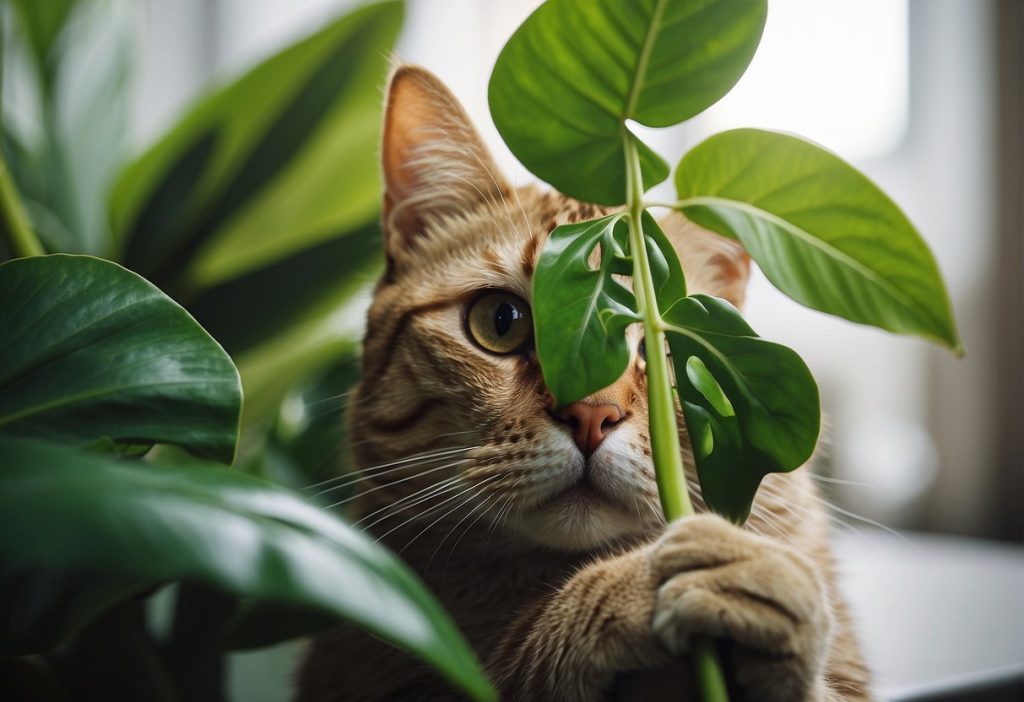
Understanding the risks associated with Monstera and cats is critical, whether you already have this plant in your home or are considering adding it to your collection.
As stylish as they are, Monsteras contain insoluble calcium oxalate crystals, which can cause a series of unpleasant symptoms should your cat decide to nibble on any parts of the plant, including the stems, leaves, roots, and unripe fruit. (1)
Knowing this, you’re likely looking for insights on how to maintain harmony between your love for plants and the safety of your cat.
This article is tailored for you, aiming to offer valuable information on the toxicity of Monsteras, foreseeing any scenarios where your cat might be exposed to different parts of the plant, and what immediate steps to take.
If you’re a plant enthusiast who cherishes both leafy greens and feline companions, you understand the importance of creating a safe environment that caters to both.
By arming yourself with the knowledge of toxicity levels, preventive measures, and emergency responses, keeping both your Monstera and cat happy and healthy becomes much more manageable.
Let’s dive into what makes Monstera plants a concern for cat owners and how to prevent any unwelcome trips to the vet, while still enjoying the beauty of these tropical natives and other safe indoor plants.
You Might Also Want to Know… – Are there any safe alternatives to Monstera plants for cat-friendly homes?
Yes, there are cat-friendly indoor plants that can be considered as alternatives to Monstera, which are non-toxic for cats.
Key Takeaways
- Monsteras are toxic to cats due to insoluble calcium oxalate crystals.
- Immediate care is necessary if a cat ingests parts of a Monstera plant.
- Cat owners can cultivate Monsteras safely with proper preventive measures.
Are Monstera Toxic to Cats?
What Makes Monsteras Toxic?
Monsteras, like many houseplants, carry their defense system against munching critters. This defense comes in the form of calcium oxalate crystals—sharp little guys that can cause a heap of discomfort.
When your cat chews on Monstera leaves, which are the only part of the plant that is meant to be eaten, these crystals penetrate the soft tissues of the mouth, throat, and stomach, making them toxic to cats.
This allows the plant to disperse its seeds more widely through animals and their digestive systems.
Symptoms of Toxicity in Cats
If a curious kitty takes a bite, here’s what might happen:
- Irritation in the mouth: Look for excessive drooling or pawing at the mouth.
- Pain and swelling: Your cat may struggle to swallow due to swollen tissues.
- Vomiting: An upset tummy will often result in throwing up.
These symptoms are tell-tale signs that your cat might have tangled with a Monstera.
Severity of Toxicity
Now, while the term “toxic” can sound alarm bells, it’s worth noting that the severity can vary.
It’s not often a life-and-death situation but seeing your cat in discomfort certainly isn’t fun for anyone involved.
So what can you do? If you suspect your Monstera and cat had an unfriendly encounter, best to contact your vet posthaste.
They’ll have the know-how to soothe your kitty’s troubles and perhaps recommend keeping that Monstera on a high shelf, far from curious paws.
First Aid and Emergency Response
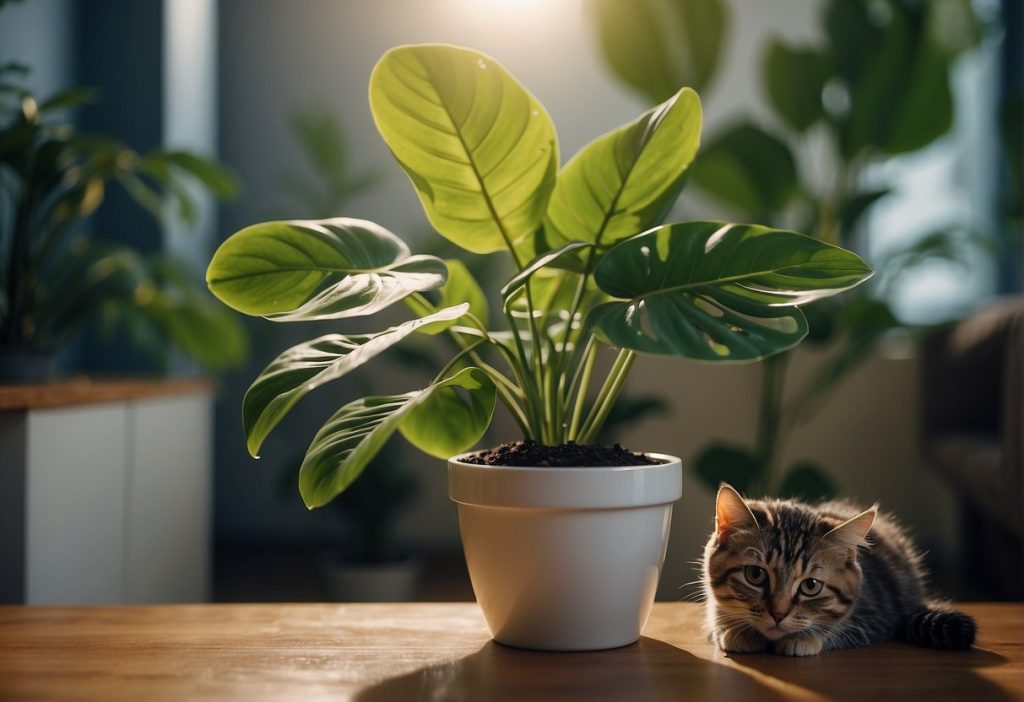
Immediate Actions for Cat Owners
- Remove Plant Material:
Gently remove any pieces of the plant from your cat’s mouth. - Rinse Mouth:
Offer water to your cat to help wash away any remaining crystals. A gentle rinse with a turkey baster can also be effective. - Calm Your Cat:
Keep them calm and comfortable. Stress can exacerbate symptoms.
First Aid Kit Essentials
- Phone Number for Vet/Animal Poison Control: Crucial for quick advice.
- Turkey Baster: For rinsing your cat’s mouth.
- Water Bowl: To encourage them to drink and rinse their mouth.
When to Seek Veterinary Help
Your cat’s health is the top priority. Observe for these symptoms:
- Excessive drooling
- Difficulty swallowing
- Vomiting
- Pawing at the mouth
- Loss of appetite
- Swelling of the mouth or throat
These symptoms are serious. Don’t wait it out if they persist – take your cat to the vet. It’s better to be cautious than to risk your buddy’s health.
Remember, while fatalities from Monstera ingestion are rare, your quick response is vital for your cat’s rapid recovery. Your furry pal relies on you, so keep these tips in mind for a safe and happy pet home.
Keep that emergency vet number handy (just in case) and make your Monstera plant a ‘look but don’t touch’ display.
If you suspect your cat has ingested any part of your monstera plant, do not hesitate to seek a consultation with your vet or contact Animal Poison Control at 1-888-426-4436 for immediate assistance.
Preventing Exposure and Ensuring Safety
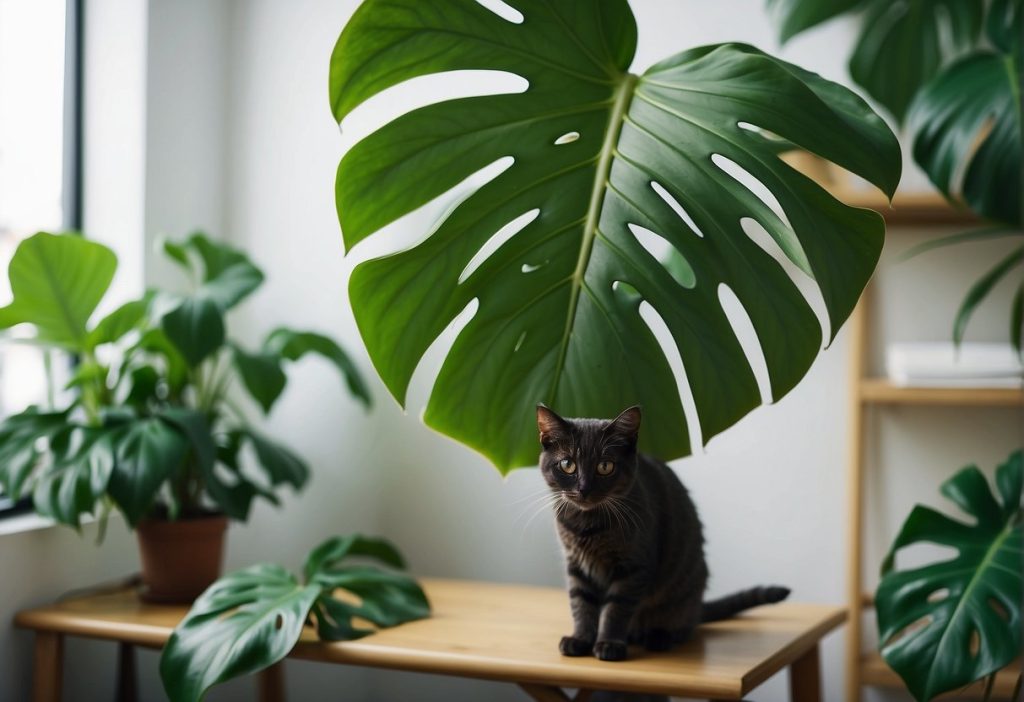
Create a barrier
Sometimes, a clear boundary is all it takes. A decorative fence or plant cage around your Monstera can discourage Kitty from making that leap.
Distract with alternatives
Cats often nibble on plants out of boredom or curiosity. Offer them their cat-safe grass or nip to munch on. You’re not only redirecting their attention but also providing them with a healthy snack.
Here’s a quick list of cat-friendly plants to fill your space with worry-free greenery:
- Spider Plant: Easy to grow and non-toxic.
- Boston Fern: A lush, fluffy option that’s safe for cats.
- Bamboo Palm: Adds a tropical flair without the worry.
Training and discipline
A stern “no” when your cat approaches the Monstera, followed by redirection, can work wonders over time. Some use a spray bottle for added deterrence.
Remember, consistency is key. Keep up these habits and both your feline and flora can flourish together, safely and happily!
Understanding and Managing Risks
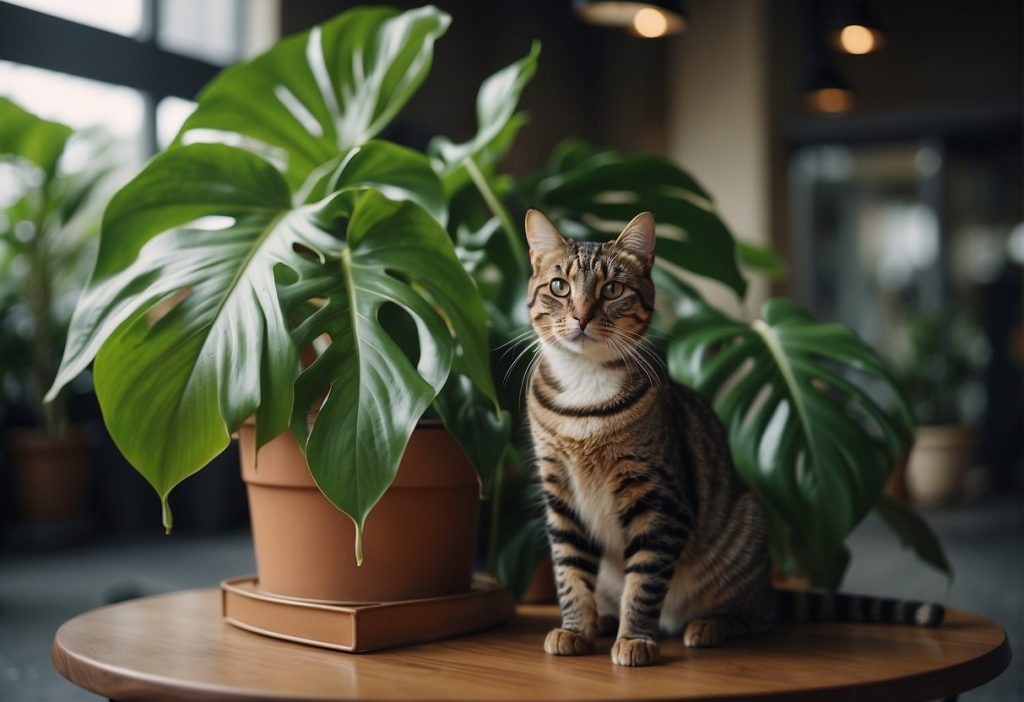
Assessing the Real Risk to Your Cat
Ever wondered what happens when your feline friend decides your Monstera is a jungle gym? Well, let’s get into the leaf of it—pun intended!
Monstera plants contain calcium oxalate crystals, which can be irritating if your cat nibbles on them. Your pet’s behavior plays a role here. Some cats are naturally more curious and may try to eat plants more often.
To understand and manage the risks, it’s important to keep your cat’s litter clean and fresh and provide them with a suitable litter tray.
To avoid them using your houseplants as a litter box, make sure to keep your cat’s litter tray clean and accessible at all times.
Additionally, regularly cleaning and refreshing the litter in the tray can help prevent your cat from seeking out alternative places to do their business.
- Frequency of interaction with plants
- Signs of nibbling or chewing
- The cat’s overall interest in foliage
Behavioral studies suggest that cats with a higher propensity to chew plants may be at greater risk.
Long-Term Health Implications
You’re probably questioning, “Is this Monstera going to be a long-term health menace?” It’s a valid concern.
While serious cases are rare, repeated exposure to the plant’s toxins can cause more than a bad taste in your cat’s mouth.
In the long run, this might include issues such as oral irritation, pain and swelling of mouth, tongue, and lips, excessive drooling, vomiting, and difficulty swallowing.
Understanding and managing these risks is crucial for pet owners and parents to ensure the safety of their loved ones.
- Persistent irritation in the mouth (2)
- Gastrointestinal problems (3)
- Potential for throat swelling in severe cases (4)
It’s not typically fatal, but keeping your Monstera out of reach is wise. Here’s how you can manage the risks:
- Place your Monstera on a high shelf or in a room that’s off-limits to kitty explorers.
- Use natural deterrents like citrus peels around the plant.
- Provide cat-friendly plants to distract your furry companion.
Remember, you’re the best safeguard your cat has against plant-related woes. Keep those eyes peeled and stay informed!
Practical Advice for Cat Owners and Plant Enthusiasts
Ever wondered how to keep your leafy loves and your furry friends in harmony? Well, you’re in luck! Here’s a cheeky guide to prevent your cat from turning into a Monstera muncher.
Plant Care and Safety Measures
- Out of Reach:
Place your Monstera high up—think hanging baskets or tall shelves. Cats are climbers, so make sure it’s a true challenge! - Barrier Methods:
Use plant stands or decorative cages. Not only do they add flair to your decor, they keep kitty’s nibbles at bay. - Regular Training:
Gently but consistently discourage your cat from approaching the plant. A stern “no” or clap can dissuade their curiosity over time. - Substitution Strategy:
Offer cat grass as an alternative snack. It’s the peace treaty between your cat’s cravings and your Monstera’s well-being. (5)
Creating a Cat-Friendly Environment
- Pet-Safe Plants:
Fill your space with non-toxic greenery. Spider plants and Boston ferns? Sure, they’re the innocent bystanders cats can safely frolic with. - Observation:
Keep an eagle eye on your cat. Notice the slightest change in behavior around new plants? It’s time to reassess your setup. - Safe Zone:
Create ‘plant-free’ zones. Having areas where your cat can roam without temptation is like a breath of fresh mint—speaking of which, did you know cats love that too?
So, what’s the takeaway? Your cat may view your Monstera as a salad bar, but with these tips, you’ll ensure the party never starts.
Remember, as much as your green thumb tickles with joy for those tropical leaves, keeping your whiskered pal safe and sound tops the priority list. Now, go create that meow-nificent and leafy safe-haven!
Expert Insights and Comprehensive Strategies
Ever wondered if your textured treasure, the Monstera, might be a foe to your fluffy friend? You’re not alone! Veterinary experts confirm that Monstera plants are indeed toxic to cats.
The culprit? A pesky substance called insoluble calcium oxalate crystals can cause skin irritation and other symptoms.
When your cat chomps down on a Monstera leaf, those crystals can cause some serious discomfort.
Here’s a quick rundown of what you might notice if your cat takes a nibble:
- Acute pain in their mouth
- Swelling of the oral tissues
- Excessive drooling
- Difficulty swallowing
You’re probably asking, “What should I do next?” If you catch your cat in the act, veterinarians suggest flushing their mouth with water and offering a drink to ease the irritation.
Milk, surprisingly, can also help to soothe those irritated tissues.
But here’s the kicker:
If symptoms persist, it’s time for a trip to the vet. Quick action here is the key to a happy, healthy kitty.
Now, let’s strategize to keep both your cat and Monstera happy:
- Place your Monstera out of reach, like on a high shelf.
- Consider using plant cages or decorative grates.
- Apply a natural cat repellent to the plant leaves.
- Keep your cat entertained with plenty of toys.
- Regularly check in with your vet for more personalized advice.
Your green buddy might look like an in-house jungle gym, but with these tips, you can maintain peace in your plant-filled paradise!
Quick Recap
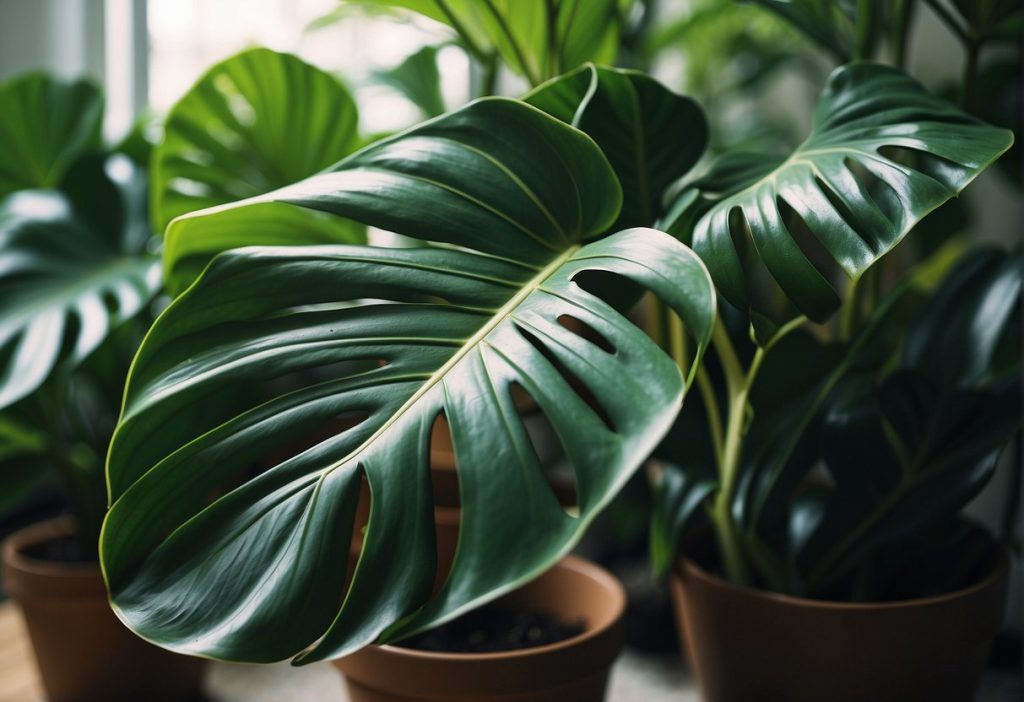
Did you hear the buzz about Monsteras and our feline friends? If you’re in a rush and want to safeguard your kitty, here’s the lowdown:
- Toxicity: Yes, Monstera deliciosa plants are indeed toxic to cats. They contain insoluble calcium oxalates which, if ingested, can cause discomfort and are harmful to your cat’s well-being.
| Substance | Effect on Cats |
| Calcium Oxalates | Causes pain and swelling in the mouth and gastrointestinal tract |
- Symptoms: Swelling, pain, and a burning sensation in the mouth, difficulty swallowing, and vomiting.
- Exposure: Even a “nip” or a chew on the leaves can be concerning. Better safe than sorry—don’t let those stylish leaves fool you!
You love your greenery, and you adore your cat, right? So, let’s keep both joys of your life thriving. Here’s the game plan:
- Keep it high: Place your Monstera out of paws’ reach.
- Distract with cat-safe plants: Maybe a cat grass kit to keep those whiskers happily twitching?
- Monitor your pets: Cats are sly, so keep an eye out for any mountain-climbing shenanigans around your Monstera.
Remember, blending a lush plant vibe with a cat-friendly space is like mixing a tropical smoothie—blend it right, and it’s a delightful treat, but one wrong ingredient and you have a mess on your hands! Keep your Monstera, keep your cat joyous, and nip any toxicity in the bud.
Frequently Asked Questions
When it comes to your furry friends and houseplants, knowing the facts can save the day. Let’s take a look at some common concerns you might have about Monstera plants and your curious cats.
Are all Monstera species equally toxic to cats?
No, all Monstera species are not equally toxic to cats. However, all species do contain insoluble calcium oxalate crystals, which can cause discomfort in cats when ingested.
What immediate steps should I take if my cat ingests Monstera?
If you catch your cat nibbling on a Monstera, you’ll want to rinse its mouth gently with water to remove any plant residue. Observe your cat closely and contact your vet for further advice.
Can Monstera toxicity be fatal to cats?
Monstera plant toxicity is generally low-risk and not considered to be fatal to cats. The primary reaction is mild irritation rather than life-threatening issues.
How can I tell if my cat has been poisoned by a Monstera plant?
Signs of Monstera poisoning in cats include pawing at the mouth, drooling, vomiting, and decreased appetite. If you notice these symptoms, it’s vet time!
What are some effective cat deterrents to prevent them from chewing on plants?
To keep your whiskered companions away from your Monstera, try using citrus peels, cayenne pepper, or a commercial cat-repellent spray. Cats are not fans of these smells and tastes.
Are there any cat-safe alternatives to Monstera plants?
Yes, absolutely! Offer your cat a nip of catnip, or maybe some pet-friendly greens like cat grass. These are safe for your cat and might just keep them away from your Monstera.

